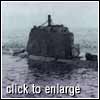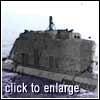The Sinking of the S. S. Athenia: September 3, 1939
 The first ship sunk by German U-boats during World War II was the S. S. Athenia, an ocean liner of the Anchor - Donaldson line. The ship was torpedoed by the German submarine U-30 two days after sailing from Glasgow, and sank off of Rockall Bank, some 250 miles northwest of Ireland on September 3rd, 1939. The event occurred less than 12 hours after the declaration of war, and seemed to be another brutal event similar to the sinking of the S. S. Lusitania before World War I, but later testimony proved this was not the case.
The first ship sunk by German U-boats during World War II was the S. S. Athenia, an ocean liner of the Anchor - Donaldson line. The ship was torpedoed by the German submarine U-30 two days after sailing from Glasgow, and sank off of Rockall Bank, some 250 miles northwest of Ireland on September 3rd, 1939. The event occurred less than 12 hours after the declaration of war, and seemed to be another brutal event similar to the sinking of the S. S. Lusitania before World War I, but later testimony proved this was not the case.
On September 1st, 1939 the 13,581-ton liner, S. S. Athenia departed Glasgow en route to Quebec City and Montreal, Canada. The ship was full of passengers, most of whom were trying to escape the rapidly approaching clouds of war which became World War II. Of the 1,412 souls on board, 1,103 were passengers including women and children, and over 300 of these passengers were Americans.
At 2100hrs or 9 p.m., on September 3rd, a huge explosion shattered the peaceful night of the passengers, as a torpedo ripped into the side of the liner. The crew responded gallantly, and their quick action saved the lives of many. Lifeboats were placed in the water, and the majority of passengers were evacuated from the rapidly sinking ship. A further explosion shot panic through the survivors, as they feared they were being shelled by the German U-boat. But things soon settled down, and most were soon picked up and transported southeast to Galway, Ireland. Still, 112 lives were lost during the sinking of the Athenia.
Initial reaction was heated on both German and British sides. Adolf Hitler himself promptly broadcast a radio order to his submarines that no passenger vessels would be targeted, fearing a propaganda disaster the likes of the Lusitania. The British and the Press had a field day, claiming that an ocean liner was sunk without warning and the survivors were shelled while loading in the lifeboats, both contrary to the rules of war.
 The event slowly faded out of the public eye, and with later testimony taken during and after the war, it was discovered that the sinking of the Athenia, although a mistake, was not entirely the fault of the German submarine crew.
The event slowly faded out of the public eye, and with later testimony taken during and after the war, it was discovered that the sinking of the Athenia, although a mistake, was not entirely the fault of the German submarine crew.
It seems as though with the outbreak of hostilities, the British were already calling ocean liners into service as troop ships for the Royal Navy. Passenger testimony reported that the portholes of the ship were painted black, curtains were placed over openings to the deck and blackout rules went into effect promptly at 6 p.m. during the voyage, standard blackout procedures for a military vessel. The S. S. Athenia was also well north of normal shipping lanes and apparently using a zig-zag course, this also gave the appearance that the ship was a military vessel. The above actions by the ship itself, combined with the fact that the U-30 did not spot the vessel until dusk at a distance, paint a very clear picture. The Captain of the U-30 thought he was attacking a military vessel, and was not required to warn such a ship before attacking. In fact, the crew of the submarine later testified that the Germans thought they were attacking a troop ship or cruiser.
As for the shelling of the passengers, the torpedo attack was a partial failure. The Captain of the U-boat had ordered two torpedoes fired, but only one "fish" actually cleared the tubes. The other torpedo was hung and armed, which forced the submarine crew to scramble to get it out of the submarine. They cleared the torpedo and it exploded very close to the submarine itself. This explosion, which was heard by the passengers, was mistaken for shellfire. The SOS call, broadcast by the Athenia, was picked up by the submarine's radioman, who promptly notified the Captain. The Captain realizing his mistake broke off the attack and returned to his patrol.
 Later evidence showed that this disaster was caused by the inexperience of the combatants. The ocean liner was running at sea like a military vessel, as the captain in all likelihood was practicing for his ship's future role in the British Navy. As for the German Captain, his only mistake was not helping the passengers after his radioman reported that it was a civilian vessel. Thus the entire event takes on an aura of just one of the many cruelties of war. Later evidence showed that this disaster was caused by the inexperience of the combatants. The ocean liner was running at sea like a military vessel, as the captain in all likelihood was practicing for his ship's future role in the British Navy. As for the German Captain, his only mistake was not helping the passengers after his radioman reported that it was a civilian vessel. Thus the entire event takes on an aura of just one of the many cruelties of war.
by BW, May 2000
Links:
The Sinking of the Athenia
Athenia's Mysteries Revealed
U-boat realted History
3 September 1939
War in the Atlantic
|



